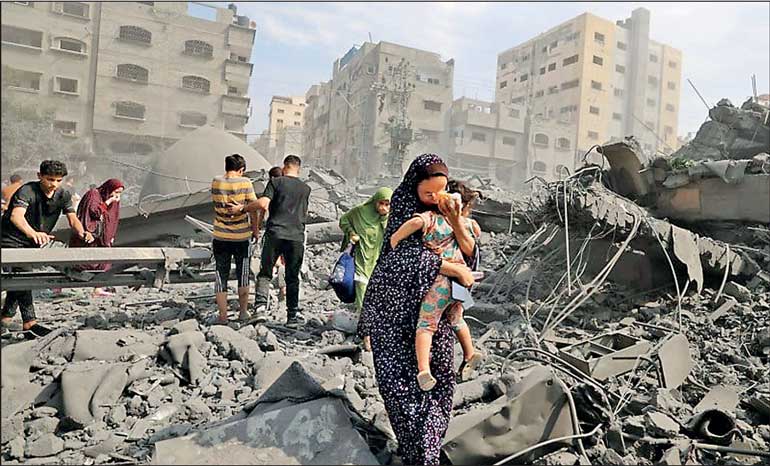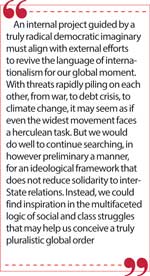Monday Feb 23, 2026
Monday Feb 23, 2026
Wednesday, 19 June 2024 00:26 - - {{hitsCtrl.values.hits}}

With Israel’s ongoing genocidal assault on Gaza, there is indeed an even more pervasive sense that foreign policy can no longer be separated from domestic politics, as Western protestors have made clear
 Recently, the Financial Times columnist Gideon Rachman wrote a piece titled “America Breaks Global Rules as It Defends the Free World.” He argued that the collective West must revamp the way it understands its project, not as an attempt to defend a ‘rules-based’ international order but rather the ‘free world’. The distinction is telling.
Recently, the Financial Times columnist Gideon Rachman wrote a piece titled “America Breaks Global Rules as It Defends the Free World.” He argued that the collective West must revamp the way it understands its project, not as an attempt to defend a ‘rules-based’ international order but rather the ‘free world’. The distinction is telling.
In Rachman’s account, the difference is that if the West relies on a notion of rules, its own hypocrisy can be called to account. For example, the US’s hostility to the International Criminal Court and its attempt to hold Israel’s leaders accountable for war crimes in Gaza. In contrast, the free world is a concept that is flexible enough to accommodate Western support for regimes that would otherwise be considered authoritarian or repressive in defence of larger foreign policy goals. The Biden administration’s rapprochement with Saudi Arabia is only one of the most recent, vertigo-inducing examples.
Subsequently, in a separate article titled “From France to America, the Far Right Is on the March,” Rachman has put forward the argument that the internal danger to the West’s own democracies now hinges on a crucial distinction between the Right and far Right. Specifically, Rachman defines the latter as a political movement hostile to the very concepts of democracy and the rule of law. While the new Right under politicians such as Marine Le Pen and Giorgia Meloni no doubt champion policies that liberals would otherwise find noxious, their growing reconciliation with the establishment indicates that they themselves do not necessarily envision a hostile takeover of government. According to Rachman, that means that they can also be expelled from power come the next election. In contrast, someone like Donald Trump is far more likely to engage in violence and extra-legal intimidation to secure their political objectives.
Of course, Rachman is by no means the first or the last figure in the Western establishment to articulate diverging external and internal attitudes towards democracy. But the timing of his output provides a crucial opportunity to reflect on a core paradox. In a word, stability abroad is always defined by what the West wants, whereas the establishment can claim to defend democracy against the far Right at home. The point is not to chalk up this tendentious distinction to mere hypocrisy. Rather, we should see in it a contradiction that structures Western thinking about the relationship between sovereignty and democracy, insofar as it is applied to a radically unequal world.
Of course, it only makes sense within this framework that the West retains the ultimate authority to decide on the ‘state of exception’, or when democracy matters less than stability in its support for repressive regimes abroad. But the implication for genuine progressives is that an alternative political imaginary is urgently required in those parts of the world aiming to resist this desperate attempt to reassert Western hegemony.
The rhetoric of sovereignty
At the same time, it is also understandable why many, especially within ‘emerging powers’, would see value in aligning with a new set of priorities that resists the West’s logic by playing on the notion of respect for sovereignty. In this equation, any talk of democracy is merely a cynical mask for Western intervention. In contrast, sovereignty implies non-judgmental accommodation with a range of political systems. Above all, the common denominator is resistance to the West’s supposed attempt to impose its hegemonic project on the world. Thus, the alliance between military regimes in the West African Sahel and their Russian patron makes sense. If the West is not willing to respect the fact that security trumps all—including the need for Sahelian States to draw support from any range of geopolitical partners to contain the Islamist threat—then what is the point of aligning with it?
In this regard, the rhetoric of sovereignty, insofar as it implies the freedom for States to choose their external supporters, sounds persuasive. But the resulting debate about whether ‘values’ drive geopolitics in fact reveals a new contradiction. The problem is not captured either in the narratives repeated by the Western establishment nor the emerging story of resistance to the West supposedly led by emerging powers such as Russia or China. Instead, the fact that the interests of the State circumscribe not only ‘terrorist’ threats but also popular democratic movements—regardless of how such suppression is framed—reflects the reality that there is an underlying struggle that cannot be captured in either the rhetoric of stability or sovereignty.
 Instead, it makes far more sense to talk about the ongoing dialectic between revolution and counter-revolution, which cuts across the geopolitical divide between the West and the Rest. As the historian Arno Mayer pointed out long ago, this distinction from the interwar period in Europe contained an instructive parallel with Third World struggles for national liberation and the imperialist response during the Cold War.
Instead, it makes far more sense to talk about the ongoing dialectic between revolution and counter-revolution, which cuts across the geopolitical divide between the West and the Rest. As the historian Arno Mayer pointed out long ago, this distinction from the interwar period in Europe contained an instructive parallel with Third World struggles for national liberation and the imperialist response during the Cold War.
Given that the West was the predominant arbiter of counterrevolution during the Cold War, it is easy to see why the framing of conflict between the West and what is now known as the global South appears to have evolved into a question of countries demanding their sovereignty back. But the real challenge is to uncover the underlying social and class dynamics that inform conflicts within different societies, and their manifold implications for the exercise of ruling class power. In today’s context, it requires little effort to invert the West’s problematic, identifying it not as the champion of the free world, but rather as a cynical operator attempting to preserve its dying hegemony.
Nevertheless, this focus alone does not get to the core of critical work such as Mayer’s that made visible an ‘international civil war’; meaning, the external projection of domestic conflicts between revolutionaries and counterrevolutionaries. In this regard, there is a world of difference between the Soviet Union—which, in fact, exercised a conservatising influence on revolutionary movements abroad—and Putin’s Russia, which is downright counterrevolutionary.
Taking back democracy
Of course, part of the challenge is that the very imaginary of revolution has receded with the collapse of the Soviet Union. Accordingly, it is far more difficult to identify the historical implications of the mass protest movements that have disappeared almost as quickly as they have emerged over the past decade-and-a-half since the Global Financial Crisis of 2008 especially. Nevertheless, in a world in which we appear to be headed closer to direct conflict between the great powers, there is an urgent need to resurrect the spirit of internationalism that allows us to identify the connections between popular democratic struggles across the global North and South.
With Israel’s ongoing genocidal assault on Gaza, there is indeed an even more pervasive sense that foreign policy can no longer be separated from domestic politics, as Western protestors have made clear. But we are yet to encounter similar ideological clarity among progressives when it comes to framing the response to emerging debt crises in countries across the global South.
Perhaps the intellectual adaptability of Rachman among others has made it unpalatable to talk about democracy in this context. Surely what matters most for Sri Lanka, for example, is to align with a new group of emerging powers who can take on the hypocritical West? But with the IMF keen as ever to back an illegitimate Government in Sri Lanka, we cannot allow the West to claim the mantle of democracy uncontested. Instead, we must find a way of rediscovering the historical principles that animated the language of democracy in the first place. That includes the demand for popular participation in decisions that affect working people. Of course, the class boundaries of democracy are often reified in easy rhetoric about the need to observe the rule of law. But Sri Lanka’s own people’s movement made unavoidable the crucial distinction between legality and legitimacy. It leads us to a question that has yet to be answered: what political structure can accommodate popular demands for relief and stimulus amid an unprecedented crisis?
There are no geopolitical actors, whether among the West or its ostensible opponents, that can resolve this problem for us. Instead, an answer depends on continued collective resistance to help us identify the appropriate democratic forms through which we can envision an alternative order capable of transcending current attempts to legislate austerity. With the recent onslaught of bills, epitomised most recently by the Economic Transformation Bill, it may seem that any attempt to stall this inexorable process is hopeless. But in keeping with the theme of democracy as a moral horizon, we must be able to identify different tendencies of resistance, however subtle or explicit, as they converge on a new politics. The latter is inseparable from an economic alternative incorporating themes such as self-sufficiency, industrial policy, accumulation for development, and so on.
Reviving internationalism
Meanwhile, in practical terms, an internal project guided by a truly radical democratic imaginary must align with external efforts to revive the language of internationalism for our global moment. With threats rapidly piling on each other, from war, to debt crisis, to climate change, it may seem as if even the widest movement faces a herculean task. But we would do well to continue searching, in however preliminary a manner, for an ideological framework that does not reduce solidarity to inter-State relations. Instead, we could find inspiration in the multifaceted logic of social and class struggles that may help us conceive a truly pluralistic global order. That means one in which each country is no longer subordinated to the logic of capitalism in its most rapacious form, regardless of whether the system is mediated by Western hegemony or anarchic competition between old and emerging powers.
Consequently, to link the question of each country’s trajectory with enduring resistance to the exercise of ruling class power on a world scale means rejecting any attempt to conflate societies with States. This task is imperative, regardless of whether the equation of people with the regimes that rule them is communicated in the language of stability or sovereignty.